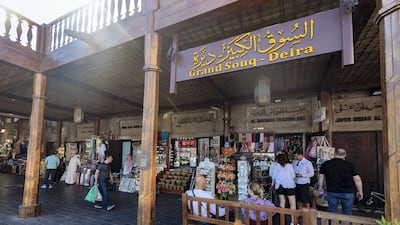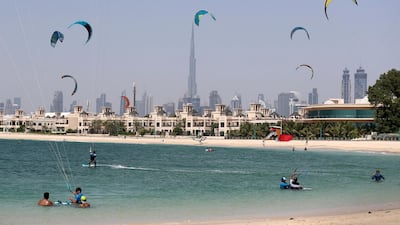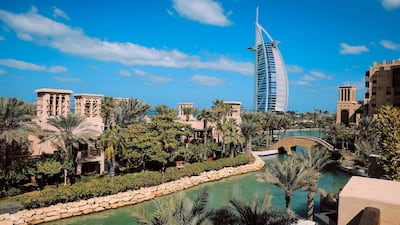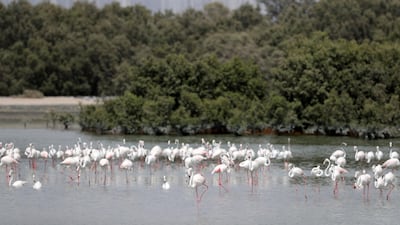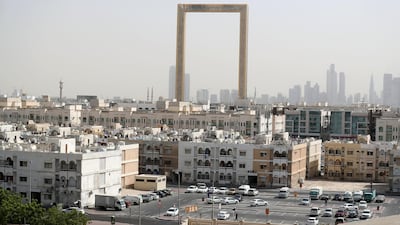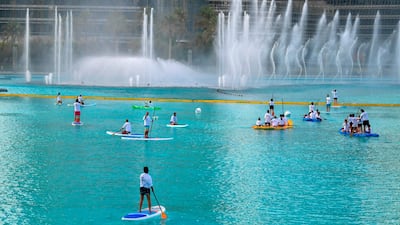The tourism industry in Dubai is reinventing itself to attract winter visitors with an emphasis on safety and value for money rather than luxury.
The National spoke to a number of leading hospitality and travel experts who said the emirate could look forward to a robust tourism season, despite the impact of the Covid-19 pandemic.
Whereas luxury was the key selling point for Dubai tourism in previous years, the focus is now firmly on safety, flexibility and value for money.
The fact that visitors are not required to undergo mandatory quarantine on arrival is also an attraction for tourists and those hoping to visit family who reside in the emirate.
“While priorities might have changed, people will want to reunite with their families and friends and for that to happen, many will consider pursuing international travel,” said Tim Cordon, Radisson Hotel Group senior vice manager for the Middle East and Africa.
“The unique selling points of a hotel no longer focus solely on location, it focuses on the flexibility the guest has in terms of bookings and cancellations, the type of experience the guest will receive when staying at the hotel and of course their safety."
Decisive move to reopen to tourists was boost to sector
Dubai reopened to tourists in July, with visitors told they must obtain a negative PCR test 96 hours prior to boarding their flight.
There is a possibility that tourists would require a second PCR test upon arrival, depending on the country they were travelling from.
Mr Cordon said Dubai’s decision to reopen to tourists would make the road to recovery an easier one as it sent a strong message the emirate was still a global hub for international travel.
“There are definite signs of a desire to return,” he said.
“There are likely to be a number of international tourists, who have been living under lockdown for months and are now looking to compensate for that confinement, with a rejuvenating break.”
He said that while he expects most international visitors to come from the UK, Germany, China and Russia, much still depended on how the pandemic unfolded over the coming months.
“Countries across Europe are seeing a resurgence in Covid-19 cases after successfully slowing outbreaks early this year,” he said.
“This is obviously something that could impact the upcoming winter months.
“The question will be if people are willing to travel and if new travel restrictions will arise.”
Hotels in emirate benefitted from growth in staycation trade
As people became used to life under the black cloud of Covid-19, there was a resurgence in the staycation market throughout the summer. That trend is set to continue, according to Mr Cordon.
“We can see that travellers still want to go on holiday, especially after being isolated for such a long time, but safety has become a top priority,” he said.
“The past months’ recovery has been driven by a rebound in domestic tourism and as a result, there has been a staycation trend and it is expected to further strengthen in the coming months.
“Recent statistics show that many hotels have been busier in July and August this year than they were at the same time last year.”
The World Travel and Tourism Council (WTTC) praised the UAE recently for how it had supported the private sector during a recent meeting of the G20, where a recovery plan for the sector was discussed.
“It is clear that we are navigating an unprecedented crisis and in order to recover, our response to this should also be unprecedented,” said Ahmad Al Falasi, UAE Minister of State for Entrepreneurship and SMEs, who took part in the meeting.
"There is no doubt that the travel and tourism industry will recover, and it will continue to support our economies.”
According to recent figures released by the WTTC, the travel and tourism sector accounted for 10.3 per cent of global GDP.
Emirates Airline confident of strong winter tourism figures
A representative for Emirates said the airline was confident that visitors would continue to flock to Dubai.
“There are a number of encouraging signs - the city re-opened to tourists in July, and in the immediate three weeks after that, we saw more than 1.6 million searches for Dubai on emirates.com, and an increase in bookings with travellers coming from more than 30 countries including France, Germany, Malaysia, UK, and US,” said the representative.
“We are also seeing healthy forward bookings to Dubai from across our network, especially in the coming peak winter months.”
The representative said a number of stringent measures were introduced to ensure the safety of passengers, both on and off the ground.
“Emirates is also the first airline to provide free cover on Covid-19 related medical expenses should a customer be diagnosed with Covid-19 during their travel while being away from home.
Another hotelier said Dubai had an opportunity to reinvent itself for a new market.
“Dubai has long been viewed as a premium destination, but it is now also able to offer real value for money to tourists from around the world,” said Paul Bridger, head of Rove Hotels.
“These attractions include Ain Dubai, the world’s tallest observational wheel, Dubai Safari, the soon-to-open world’s largest fountain at Palm Jumeirah, as well as the Museum of the Future, which is set to be one of the most iconic landmarks in the world, and the long-awaited Expo 2020.”
Another sign of how the market was evolving was the rise of people looking for staycations and daycations, according to a senior figure from Dnata Travel.
“The UAE currently is, and always has been, the number one travel destination of choice for UAE travellers,” said Emily Jenkins, Dnata's UAE head of travel and leisure.
“With such variety on our doorstep, UAE residents can escape to the ocean, beach, mountains, desert, an island, or to the city this winter, as more travellers seek a holiday closer to home.”
She said a recent survey of thousands of UAE residents had shown 91 per cent were prepared to travel domestically in 2020/21.







